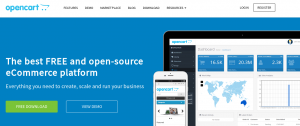Top 9 open-source eCommerce platforms in 2020

Open-source eCommerce platforms are on the high-demand right now. Why is it so? Because according to sources, there are up to 24 million eCommerce websites in 2020. Indeed, the industry continues to gain momentum covering more and more niches.
Besides this, customers have become increasingly demanding over the years. That is why not only the goods/services and their quality will play a huge role. The marketplace itself should be on-point to attract customers and grasp their attention.
Understanding the growing necessity of eCommerce platform’s use, we’ve gathered 9 open-source platforms you can use to develop your business.
What is an open-source eCommerce platform?
Before we start talking about the platforms, let’s figure out what they are in the first place.
An open-source eCommerce platform is a free software that has no or one-time license charge. So, the users are in charge of downloading, installing, and maintaining the platform. Users host the software on their servers. Moreover, the company that uses the open-source eCommerce platform should have a development/design department or a professional to configure the software. The open-source nature of the platform means the software owners can change the initial source code.
All-in-all, eCommerce platforms of this type provide a range of advantages to business owners. Firstly, they are mainly free. Plus, they have everything to satisfy your customers’ needs. Open-source software is highly flexible, with a wide range of plugins and extensions.
Top 9 open-source eCommerce platforms in 2020
WooCommerce

WooCommerce, by far, is one of the most popular and used open-source platforms. The company claims to serve 28% of the online shops. The platform works based on WordPress. Firstly, the company provided a variety of themes for different industries. Yet, for the last three years, WooCommerce provides solutions exclusively for the eCommerce owners.
The company aims to democratize the delivery of open-source software. That is why this highly flexible platform comes free of charge. There are plugins the customers may pay for. Yet, the core platform gives a lot of opportunities. Not only is it an add-on for WordPress, but it also is compatible with numerous WordPress plugins. That makes WooCommerce a perfect choice for small and medium business owners.
- Year of creation. 2011
- Language. PHP
- Data storage. MySQL, MySQLi
- Source code offered. Yes
- Digital downloads. Yes
- Statistics. Yes
- API. Yes
Magento

Magento is also a very trusted and popular open-source eCommerce software. Over 100,000 online shops use this software. The platform enables third-party integrations. Besides, Magento has a wide network of implementation partners and a huge selection of extensions. The platform provides the right products for different business models – B2B, B2C, and B2B2C ones.
Magento takes the benefit of offering cloud solutions to its clients. Thanks to them, this company lets its clients use the omnichannel approach at its fullest. Magento also partners with Adobe to deliver even more features. Business owners can make a full cycle of marketing activities, thanks to it. Magento is a perfect choice for SMEs and big enterprises.
- Year of creation. 2007
- Language. PHP
- Data storage. MySQL, MySQLi
- Source code offered. Yes
- Digital downloads. Yes
- Statistics. Yes
- API. Yes
PrestaShop

PrestaShop claims to be the software of over 300,000 online shops. The company is one of the fastest-growing in Europe. We can explain this success thanks to PrestaShop using innovations to deliver a top-notch customer experience. Besides, PrestaShop is a global community of like-minded people. The community helps to answer the most actual questions. And the contributors help to improve code permanently.
Before building a real store, users can experience a demo-version for better understanding. After this, store owners are free to use a variety of themes and customize them to meet the shoppers’ needs. Moreover, PrestaShop empowers merchants who seek global reach. Straight from the PrestaShop’s website, clients can reach dozens of add-ons.
- Year of creation. 2007
- Language. PHP
- Data storage. MySQL, MySQLi
- Source code offered. Yes
- Digital downloads. Yes
- Statistics. Yes
- API. Yes
OpenCart

OpenCart is another respected open-source eCommerce platform. So far, it numbers around 342,000 business owners who use this software. It offers a single back-end for the store managers. Nevertheless, they can manage multiple stores from a single environment. Of course, OpenCart is free software. It’s ready to use right after the installation.
Business owners who choose OpenCart, receive the support of the community in any questions they might have. Besides this, entrepreneurs can reach a broad audience in regard to vast customization options. So, OpenCart provides over 13,000 themes and modules. Thanks to easiness, quick installation, and free of charge services, OpenCart is a good fit for SMEs.
- Year of creation. 1999
- Language. PHP
- Data storage. MySQL, MySQLi
- Source code offered. Yes
- Digital downloads. Yes
- Statistics. Yes
- API. Yes
Spree Commerce

Spree Commerce is an open-source platform with over a million downloads. It might be one of the most technology-driven platforms. Besides fast installation and readiness to use, it caters to the mobile-first needs. Indeed, the platform adapts perfectly to iOS-, Android-powered smartphones as well as desktops and tablets. Business owners can get help from the huge community of developers.
Spree Commerce caters to business needs starting from hassle-free installation to almost limitless customization opportunities. Of course, clients get everything they need to get a global reach and enjoy the omnichannel approach. Spree Commerce users receive a vast selection of instruments to manage the open-source eCommerce platform. Both B2B and B2C clients can benefit from choosing this platform.
- Year of creation. 2007
- Language. Ruby
- Data storage. MySQL, PostgreSQL
- Source code offered. Yes
- Digital downloads. Yes
- Statistics. Yes
- API. Yes
Drupal

Drupal is another popular open-source platform empowering retailers all over the globe. Drupal’s community numbers in over a million users. Approximately 120,000 are actively contributing to let the whole community access better experience. Thanks to this, Drupal is highly customizable with a variety of modules and themes clients can use free of charge.
Drupal assists clients from multiple industries in getting resources to build a proper website. Business owners can directly go to the dedicated page to know what features they’ll get. Also, clients get recommendations on the hosting platforms. Drupal caters to all the possible marketing needs as well. Both large and small-scale businesses can use this open-source platform.
- Year of creation. 2011
- Language. PHP
- Data storage. MySQL, MySQLi, PostgreSQL
- Source code offered. Yes
- Digital downloads. Yes
- Statistics. Yes
- API. Yes
Zen Cart

Zen Cart is open-source software that powers shopping carts for eCommerce websites. The platform offers a user-friendly online shopping bags for businesses. There’s no exact information about a number of businesses using this software or community members. Yet, the software developers have ensured the clients with basic computer skills could use it.
Clients can extend the core Zen Cart features via adding plugins. The platform has a vast choice of them. So, store owners get better control over the services they want to offer their shoppers. The software is easy to install and is ready to run straight away. Zen Cart suits small businesses that have no option to deploy separate development department.
- Year of creation. 2003
- Language. PHP
- Data storage. MySQL, MySQLi
- Source code offered. Yes
- Digital downloads. Yes
- Statistics. Yes
- API. No
osCommerce

osCommerce is an open-source eCommerce platform, and it lets create and run an online store. The software is free and created by industry professionals. So far, 20,988 business owners use osCommerce to build and maintain the store’s work. The community numbers almost 350,000 shop owners and developers. Thanks to contributions, there are over 9,000 free add-ons.
osCommerce provides access to orders’ management, a variety of templates, and community editions. In virtue of contributors’ activity, osCommerce provides in-depth customization opportunities for store owners. The platform is the right fit for both small and large-scale businesses.
- Year of creation. 2000
- Language. PHP
- Data storage. MySQL
- Source code offered. Yes
- Digital downloads. Yes
- Statistics. Yes
- API. No
X Cart

X Cart is an open-source eCommerce platform that has offered the first-ever PHP-based downloadable shopping cart. The platform provides a seamless experience and numbers over 38,000 stores running on the X Cart. License owners can easily change the source code to meet their needs. Still, clients are free to choose from a variety of themes.
A vast community makes its impact by helping developers/owners from all over the world. X Cart assists in meeting global needs for business people who seek global presence. Marketers can enjoy the omnichannel approach. Clients pay the one-time license fee. That’s why this solution fits both SMEs and large players.
- Year of creation. 2001
- Language. PHP
- Data storage. MySQL
- Source code offered. Yes
- Digital downloads. Yes
- Statistics. Yes
- API. Yes
Conclusions
To stand out among the competition, you need to provide a seamless user experience. Thus, everything from the website’s appearance, to page speed, should be on point. And the choice of the right open-source eCommerce platform can help you in this.
In this article, we’ve told you about the most used and trusted platforms. You can choose one of them based on your core needs, preferred reach (global/local), industry, and business size.
Though many platforms offer payment gateway add-ons, we recommend partnering with a “full capacity” company. It knows how to process payments of various business types. But most importantly, they’ll make sure your business enjoys better conversion and a lower decline rate. If you need a free consultation, fill in the form.



